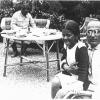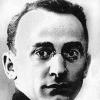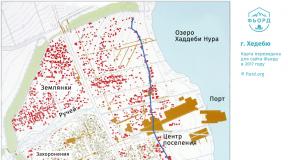Lavrenty Beria - biography, information, personal life. Beria, Lavrenty Pavlovich - short biography
Lavrentiy Beria (March 17 (29), 1899 – December 23, 1953) was born in Merkheuli, near Sukhumi (Georgia) and belonged to the Mingrelians. His mother, Marta Jakeli, was related to the local princely family Dadiani, and his father, Pavel Beria, was a landowner from Abkhazia.
In 1919, Lavrenty Pavlovich served in the counterintelligence of the Azerbaijani government Musavatists, hostile to the Soviet republic. He himself later claimed that he infiltrated there on instructions from the party. Bolsheviks, but it is unknown how true this version is. Having ended up in prison for a while, Beria struck up a relationship there with the niece of his cellmate, the aristocrat Nina Gegechkori, whose relatives occupied high positions in Menshevik government of Georgia, and among the Bolsheviks. Apparently, thanks to these patronages, Beria after the capture Red Army Azerbaijan managed to advance in Cheka. In August 1920, he became the manager of the affairs of the Central Committee of the Communist Party (Bolsheviks) of Azerbaijan, and in October - secretary of the Extraordinary Commission for the expropriation of the bourgeoisie and improvement of the living conditions of workers, where he was soon accused of falsifying criminal cases, but got out of it due to intercession A. Mikoyan.
Beria in his youth. Photo from the 1920s
When the Bolsheviks put an end to the existence of independent Georgia, Beria moved from Baku to Tiflis, becoming deputy head of the Georgian GPU(successor to the Cheka). In 1924 he played a prominent role in the brutal suppression uprising raised by Georgians.
In December 1926, Beria became chairman of the GPU of Georgia, and in April 1927, the Georgian People's Commissar of Internal Affairs. Together with S. Ordzhonikidze, he supported a common fellow countryman - Stalin - in his rivalry with Trotsky, Zinoviev and Kamenev. With the help of cynical intrigues, Beria ousted his main competitor, Stalin’s brother-in-law, from the Caucasus to Belarus S. Redensa, after which in November 1931 he was appointed head of the Communist Party of Georgia, in October 1932 - of the entire Transcaucasus, and in XVII Party Congress(February 1934) - elected member of the Central Committee of the All-Union Communist Party of Bolsheviks.
At the same congress, the influential party guard made attempts to remove Stalin and replace him S. Kirov. Behind the scenes efforts in favor of this were carried out throughout 1934. Ordzhonikidze was also inclined to side with Kirov, who, however, was unable to attend the very important November plenum of the Central Committee due to a sudden illness that befell him immediately after dinner in Baku with Beria.
Lavrentiy Pavlovich strengthened his position in Stalin’s entourage with the publication (1935) of the book “On the Question of the History of Bolshevik Organizations in Transcaucasia,” written on his behalf. It inflated in every possible way the role of Stalin in the revolutionary movement. “To my dear and beloved Master, the great Stalin!” – Beria signed the gift copy.
Started after Kirov's assassination Great Terror Stalin was also active in Transcaucasia - under the leadership of Beria. Here, Agasi Khanjyan, the first secretary of the Communist Party of Armenia, committed suicide or was killed (they say, even personally by Beria). In December 1936, after dinner with Lavrenty Pavlovich, he suddenly died Nestor Lakoba, the head of Soviet Abkhazia, who before his death openly called Lavrentiy his murderer. By order of Beria, Lakoba’s body was then dug out of the grave and destroyed. S. Ordzhonikidze’s brother Papulia was arrested, and the other (Valiko) was dismissed from his position.
Having decided to reduce the scale of terror, which was already threatening the collapse of the economy and the state, Stalin decided to displace and destroy its main conductor - the head NKVD Yezhova. Beria, transferred from the Caucasus to Moscow in August 1938, became Yezhov’s deputy, and in November replaced him as All-Union People’s Commissar. At first, Beria released 100 thousand people from the camps, recognizing them as victims of false accusations, but this liberalization was only short-term and relative. Lavrentiy Pavlovich soon led the bloody “purges” in the Baltic republics that had just been annexed to the USSR, and organized Trotsky's assassination in Mexico, in a note to Stalin No. 794/B, he recommended the destruction of Polish prisoners captured after the practical implementation of the Ribbentrop-Molotov Pact (this was accomplished by Katyn massacre).

Beria with Stalin's daughter Svetlana Alliluyeva on his lap. In the background - Stalin
In 1941, Beria received the rank of General Commissar of State Security, equivalent to Marshal of the Soviet Union. After the start Great Patriotic War Lavrenty Pavlovich joined the State Defense Committee ( GKO). During the war years he transferred millions of prisoners Gulag to the army and military production. Their slave labor was widely used in the production of weapons.
In 1944 Beria led evictions of nationalities of the USSR who collaborated with the Nazis or were suspected of it (Chechens, Ingush, Crimean Tatars, Pontic Greeks and Volga Germans). Since the end of the same year, he led the work on creating Soviet atomic bomb. Research “sharashkas” were formed from groups of arrested scientists. Tens of thousands of Gulag prisoners were sent to work in uranium mines and to build nuclear testing sites. The creation of the atomic bomb was completed in five years and thanks to Soviet espionage in the West conducted by Beria's NKVD.
In the post-war years, the struggle for the inheritance of the aging Stalin quickly intensified among the Soviet elite. Even during the war, an alliance between Beria and Malenkov. He was opposed by a bloc headed by A. Zhdanov and relying on the party leadership of Leningrad. With the support of Stalin himself, opponents ousted Beria from the post of head of the NKVD (December 30, 1945). In the summer of 1946, Beria's protege V. Merkulov was replaced at the head of another important punitive agency - the MGB - by a much more independent V. Abakumov. Having received the title of member of the Politburo as some “compensation”, Beria retained only the leadership of foreign intelligence (where he greatly contributed to helping the communists Mao Zedong in their fight with Kuomintang Chiang Kai-shek). Was destroyed (October 1946) Jewish Anti-Fascist Committee, created during the war by the hands of Beria, who, according to some information, supported the old Bolshevik idea transfers to the Jews of Crimea as an “autonomous republic”.
However, in August 1948, A. Zhdanov died under rather mysterious circumstances, and from the beginning of the next year a terrible persecution began against his supporters - “ Leningrad case" This ferocious campaign was led by Beria's ally, Malenkov. However, Abakumov, hostile to Beria, simultaneously launched a series of purges accompanied by executions against the leaders of Eastern European countries dependent on the USSR. Beria sought an alliance with Israel to impose Soviet influence in the Middle East, but other Kremlin leaders decided instead to establish an anti-Israeli partnership with the Arabs. Among the Eastern European leaders, it was primarily the Jews who were “cleaned out,” whose percentage in the local leadership was many times greater than their share in the population. Partly continuing Zhdanov’s previous line of struggle against “rootless cosmopolitanism,” Abakumov’s successor, S. Ignatiev, in January 1953 opened the largest anti-Jewish action in the Soviet Union - “ The Doctors' Case».
In the midst of all these events, on March 5, 1953, unexpectedly Stalin died. The version of his poisoning by Beria with the help of warfarin has received a lot of indirect confirmation in recent years. Summoned to the Kuntsevskaya dacha to see the struck leader on the morning of March 2, Beria and Malenkov convinced the guards that “Comrade Stalin was simply sleeping” after a feast (in a puddle of urine), and ordered “not to disturb him” and “to stop panicking.” The call to the doctors was delayed for 12 hours, although the paralyzed Stalin was unconscious. All these orders, however, were tacitly supported by the other members Politburo. According to the memoirs of Stalin's daughter, S. Alliluyeva, after the death of her father, Beria was the only one of those gathered at the body who did not even try to hide his joy.

Lavrenty Beria in the last years of his life
Beria was now appointed first deputy head of government and head of the Ministry of Internal Affairs, which he immediately merged with the MGB. His close ally Malenkov became head of government. Khrushchev headed the party, and Voroshilov took the post of chairman of the Presidium of the Supreme Council (head of state). A power struggle immediately began between all these “comrades-in-arms.” At first, Beria’s position in it seemed perhaps the strongest, but the arrogance and power of Lavrenty Pavlovich pushed everyone else to unite against him. Even Malenkov recoiled from Beria. Rivals did not like Laurentius's risky foreign policy initiatives. Believing that the USSR was too weakened by the war, Beria hinted: in exchange for financial assistance from the United States, it would be reasonable to renounce hegemony over East Germany, return Moldova to Romania, the Kuril Islands to Japan, and even restore the independence of Estonia, Latvia and Lithuania.
The conspiracy against Beria was led by Khrushchev. Having convened the Presidium of the Central Committee on June 26, 1953 (as the Politburo was now called), he suddenly declared the stunned enemy there a “paid agent of Western intelligence services.” In order to prevent state security forces loyal to Beria from coming to the aid of their boss, Marshal Zhukov and the Minister of Defense participated in the conspiracy Bulganin They called the Kantemirovskaya tank division and the Tamanskaya motorized rifle division to Moscow. Beria was arrested right during the meeting of the Presidium. At the same time, other prominent punitive authorities were also captured.
By the Special Judicial Presence of the Supreme Court of the USSR on December 23, 1953 (presided by Marshal Koneva) Beria and his supporters were sentenced to death. When the verdict was read, Lavrenty Pavlovich begged for mercy on his knees, and then fell to the floor and sobbed desperately. During the execution, this recent all-powerful and ruthless arbiter of human destinies screamed so loudly that they had to stuff a towel into his mouth. Beria's executioner was General Batitsky, who hated him.
Beria Lavrenty Pavlovich - Deputy Chairman of the Council of People's Commissars (SNK) of the USSR, member of the State Defense Committee (GKO), People's Commissar of Internal Affairs of the USSR, General Commissioner of State Security.
Born on March 16 (29), 1899 in the village of Merkheuli, Sukhumi district, Tiflis province, now the Republic of Abkhazia (Georgia), in a peasant family. Georgian. In 1915 he graduated with honors from the Sukhumi Higher Primary School. Since 1915 he studied at the Baku Secondary Mechanical and Construction Technical School. In October 1915, with a group of comrades, he organized an illegal Marxist circle at the school. Member of the RSDLP(b)/RCP(b)/VKP(b)/CPSU since March 1917. Organized a cell of the RSDLP(b) at the school. During the First World War of 1914-18, in June 1917, as a technician trainee at the army hydraulic engineering school, he was sent to the Romanian front, where he conducted active Bolshevik political work among the troops. At the end of 1917, he returned to Baku and, while continuing his studies at a technical school, actively participated in the activities of the Baku Bolshevik organization.
From the beginning of 1919 until April 1920, that is, before the establishment of Soviet power in Azerbaijan, he led an illegal communist organization of technicians and, on behalf of the Baku Party Committee, provided assistance to a number of Bolshevik cells. In 1919, Lavrentiy Beria successfully graduated from technical school, receiving a diploma as a technical architect-builder.
In 1918-20 he worked in the secretariat of the Baku Council. In April-May 1920 - commissioner of the registration department of the Caucasian Front at the Revolutionary Military Council of the 11th Army, then sent to underground work in Georgia. In June 1920, he was arrested and imprisoned in Kutaisi prison. But at the request of the Soviet plenipotentiary representative S.M. Kirov Lavrentiy Beria was released and deported to Azerbaijan. Returning to Baku, he entered the Baku Polytechnic Institute to study (which he did not graduate from).
In August-October 1920, Beria L.P. - manager of the affairs of the Central Committee (Central Committee) of the Communist Party (Bolsheviks) of Azerbaijan. From October 1920 to February 1921 - executive secretary of the Extraordinary Commission (Cheka) for Baku.
In intelligence and counterintelligence agencies since 1921. In April-May 1921 he worked as deputy head of the secret operational unit of the Azerbaijan Cheka; from May 1921 to November 1922 - head of the secret operational unit, deputy chairman of the Azerbaijan Cheka. From November 1922 to March 1926 - deputy chairman of the Georgian Cheka, head of the secret operational unit; from March 1926 to December 2, 1926 - deputy chairman of the Main Political Directorate (GPU) of the Georgian SSR, head of the secret operational unit; from December 2, 1926 to April 17, 1931 - deputy plenipotentiary representative of the OGPU in the Transcaucasian Soviet Federative Socialist Republic (ZSFSR), deputy chairman of the Transcaucasian GPU; from December 1926 to April 17, 1931 - head of the secret operational department of the plenipotentiary representative office of the OGPU in the Trans-SFSR and the Transcaucasian GPU.
In December 1926 L.P. Beria was appointed chairman of the GPU of the Georgian SSR and deputy chairman of the GPU of the ZSFSR. From April 17 to December 3, 1931 - head of the special department of the OGPU of the Caucasian Red Banner Army, chairman of the Transcaucasian GPU and plenipotentiary representative of the OGPU of the USSR in the Trans-SFSR, being from August 18 to December 3, 1931 a member of the board of the OGPU of the USSR.
In 1931, the Central Committee of the All-Union Communist Party of Bolsheviks revealed gross political mistakes and distortions committed by the leadership of party organizations in Transcaucasia. In its decision of October 31, 1931, based on the reports of the Transcaucasian Regional Committee of the All-Union Communist Party of Bolsheviks, the Central Committee of the Communist Party of Bolsheviks of Georgia, the Central Committee of the Communist Party of Bolsheviks of Azerbaijan and the Central Committee of the Communist Party of Bolsheviks of Armenia, the Central Committee of the All-Union Communist Party of Bolsheviks set the task for the party organizations of Transcaucasia immediate correction of political distortions in work in the countryside, widespread development of economic initiative and initiative of the national republics that were part of the TSFSR. At the same time, the party organizations of Transcaucasia were obliged to put an end to the unprincipled struggle for the influence of individuals observed among the leadership cadres of both the entire Transcaucasian Federation and the republics included in it and to achieve the necessary solidity and Bolshevik cohesion of the party ranks. In connection with this decision of the Central Committee of the All-Union Communist Party of Bolsheviks, L.P. Beria was transferred to leading party work. From October 1931 to August 1938 he was the 1st Secretary of the Central Committee of the Communist Party of Georgia (Bolsheviks) and at the same time from November 1931 the 2nd, and in October 1932 - April 1937 - the 1st Secretary of the Transcaucasian Regional Committee of the All-Union Communist Party of Bolsheviks (Bolsheviks) .
The name of Lavrentiy Beria became widely known after the publication of his book “On the Question of the History of the Bolshevik Organizations of Transcaucasia.” In the summer of 1933, when I.V., who was vacationing in Abkhazia, An assassination attempt was made on Stalin, Beria covered him with his body (the assassin was killed on the spot, and this story has not been fully revealed)...
Since February 1934, L.P. Beria is a member of the Central Committee of the All-Union Communist Party of Bolsheviks. In June 1937, at the Tenth Congress of the Communist Party (Bolsheviks) of Georgia, he declared from the podium: “Let the enemies know that anyone who tries to raise his hand against the will of our people, against the will of the Lenin-Stalin party, will be mercilessly crushed and destroyed.”
On August 22, 1938, Beria was appointed 1st Deputy People's Commissar of Internal Affairs of the USSR, and from September 29, 1938, he simultaneously headed the Main Directorate of State Security (GUGB) of the NKVD of the USSR. September 11, 1938 L.P. Beria was awarded the title of “Commissioner of State Security of the 1st Rank”.
On November 25, 1938, Beria was replaced by N.I. Yezhov as People's Commissar of Internal Affairs of the USSR, retaining the direct leadership of the GUGB NKVD of the USSR. But on December 17, 1938, he appointed his deputy V.N. to this post. Merkulova.
Commissioner of State Security 1st Rank Beria L.P. almost completely renewed the highest apparatus of the NKVD of the USSR. He carried out the release of some of those wrongfully convicted from the camps: in 1939, 223.6 thousand people were released from the camps, and 103.8 thousand people from the colonies. At the insistence of L.P. Beria expanded the rights of the Special Meeting under the People's Commissar of Internal Affairs of the USSR to issue extrajudicial verdicts.
In March 1939, Beria became a candidate member and only in March 1946 - a member of the Politburo (since 1952 - Presidium) of the Central Committee of the CPSU (b) / CPSU. Therefore, only since 1946 can we talk about the participation of L.P. Beria in making political decisions.
January 30, 1941 to the Commissar of State Security 1st Rank Beria L.P. awarded the title of "General Commissioner of State Security".
On February 3, 1941, Beria, without leaving the post of People's Commissar of Internal Affairs of the USSR, became deputy chairman of the Council of People's Commissars (from 1946 - the Council of Ministers) of the USSR, but at the same time, state security bodies were removed from his subordination, forming an independent People's Commissariat.
With the beginning of the Great Patriotic War, the NKVD of the USSR and the NKGB of the USSR were again united under the leadership of the General Commissioner of State Security L.P. Beria.
On June 30, 1941, Lavrentiy Beria became a member of the State Defense Committee (GKO), and from May 16 to September 1944, he was also Deputy Chairman of the GKO. Through the State Defense Committee, Beria was entrusted with the most important assignments of the Central Committee of the All-Union Communist Party of Bolsheviks, both for the management of the socialist economy in the rear and at the front, namely, control over the production of weapons, ammunition and mortars, as well as (together with G.M. Malenkov) for production of aircraft and aircraft engines.
U by the Kazakh Presidium of the Supreme Soviet of the USSR on September 30, 1943, for special services in the field of strengthening the production of weapons and ammunition in difficult wartime conditions, General Commissioner of State Security Lavrenty Pavlovich Beria was awarded the title of Hero of Socialist Labor with the presentation of the Order of Lenin and the Hammer and Sickle gold medal ( No. 80).
March 10, 1944 L.P. Beria introduced I.V. Stalin received a memo with a proposal to evict the Tatars from the territory of Crimea; later he provided general management of the eviction of Chechens, Ingush, Tatars, Germans, etc.
On December 3, 1944, he was assigned to “supervise the development of uranium work”; from August 20, 1945 to March 1953 - Chairman of the Special Committee under the State Defense Committee (later under the Council of People's Commissars and the Council of Ministers of the USSR).
By decree of the Presidium of the Supreme Soviet of the USSR dated July 9, 1945, Lavrentiy Pavlovich Beria was awarded the highest military rank “Marshal of the Soviet Union” with the presentation of a special Certificate of the Presidium of the Supreme Soviet of the USSR and the insignia “Marshal’s Star”.
After the end of the war on December 29, 1945, Beria left the post of People's Commissar of Internal Affairs of the USSR, transferring it to S.N. Kruglov. From March 19, 1946 to March 15, 1953 L.P. Beria is Deputy Chairman of the Council of Ministers of the USSR.
As head of the military science department of the Central Committee of the All-Union Communist Party of Bolsheviks (Bolsheviks)/CPSU, L.P. Beria oversaw the most important areas of the military-industrial complex of the USSR, including the nuclear project and rocket science, the creation of the TU-4 strategic bomber, and the LB-1 tank gun. Under his leadership and with direct participation, the first atomic bomb in the USSR was created, tested on August 29, 1949, after which some began to call him “the father of the Soviet atomic bomb.”
After the 19th Congress of the CPSU, at the suggestion of I.V. Stalin, as part of the Presidium of the CPSU Central Committee, a “leading five” was created, which included L.P. Beria. After the death on March 5, 1953, I.V. Stalin, Lavrentiy Beria took a leading place in the Soviet party hierarchy, concentrating in his hands the posts of 1st Deputy Chairman of the Council of Ministers of the USSR, in addition, he headed the new Ministry of Internal Affairs of the USSR, created on the day of Stalin’s death by merging the former ministry and the Ministry of State Security.
On the initiative of Marshal of the Soviet Union Beria L.P. On May 9, 1953, an amnesty was declared in the USSR, which freed one million two hundred thousand people, several high-profile cases were closed (including the “doctors’ case”), and investigative cases involving four hundred thousand people were closed.
Beria advocated reducing military spending and freezing expensive construction projects (including the Main Turkmen Canal and the Volga-Baltic Canal). He achieved the start of armistice negotiations in Korea, tried to restore friendly relations with Yugoslavia, opposed the creation of the German Democratic Republic, proposing to take a course towards the unification of West and East Germany into a “peace-loving bourgeois state.” He sharply reduced the state security apparatus abroad.
Pursuing a policy of promoting national personnel, L.P. Beria sent documents to the Republican Central Committee of the party, which spoke about the wrong Russification policy and illegal repressions.
On June 26, 1953, at a meeting of the Presidium of the CPSU Central Committee, Marshal of the Soviet Union Beria L.P. was arrested...
By decree of the Presidium of the Supreme Soviet of the USSR, he was removed from the posts of 1st Deputy Chairman of the Council of Ministers of the USSR and Minister of Internal Affairs of the USSR, deprived of all titles and awards assigned to him.
In the verdict of the special judicial presence of the Supreme Court of the USSR, chaired by Marshal of the Soviet Union Konev I.S. it was recorded that “having betrayed the Motherland and acting in the interests of foreign capital, the defendant Beria put together a treasonous group of conspirators hostile to the Soviet state with the aim of seizing power, eliminating the Soviet worker-peasant system, restoring capitalism and restoring the rule of the bourgeoisie.” The special judicial presence of the Supreme Court of the USSR sentenced L.P. Beria to death penalty.
The death sentence was carried out by Colonel General Batitsky P.F., who shot the convict with a captured Parabellum pistol in the forehead in the bunker of the headquarters of the Moscow Military District, which is confirmed by the corresponding act signed on December 23, 1953:
“On this date at 19:50, on the basis of the Order of the Special Judicial Presence of the Supreme Court of the USSR dated December 23, 1953, No. 003, by me, the commandant of the Special Judicial Presence, Colonel General Batitsky P.F., in the presence of the Prosecutor General of the USSR, Actual State Counselor of Justice Rudenko R.A. and Army General K.S. Moskalenko the sentence of the Special Judicial Presence was carried out in relation to Lavrentiy Pavlovich Beria, sentenced to capital punishment - execution".
Attempts by L.P.’s relatives Beria's efforts to reconsider the 1953 case were unsuccessful. On May 29, 2000, the Military Collegium of the Supreme Court of the Russian Federation refused to rehabilitate the former Minister of Internal Affairs of the USSR...
Beria L.P. was awarded five Orders of Lenin (No. 1236 from 03/17/1935, No. 14839 from 09/30/1943, No. 27006 from 02/21/1945, No. 94311 from 03/29/49, No. 118679 from 10/29/1949 ), two Orders of the Red Banner (No. 7034 from 04/03/1924, No. 11517 from 03/11/1944), the Order of Suvorov 1st degree; orders of the Red Banner of Georgia (07/03/1923), the Red Banner of Labor of Georgia (04/10/1931), the Red Banner of Labor of Azerbaijan (03/14/1932) and the Red Banner of Labor of Armenia, seven medals; badges “Honorary Worker of the Cheka-GPU (V)” (No. 100), “Honorary Worker of the Cheka-GPU (XV)” (No. 205 of December 20, 1932), personalized weapons - a Browning pistol, a watch with a monogram; foreign awards - the Tuvan Order of the Republic (08/18/1943), the Mongolian Order of the Red Banner of Battle (No. 441 from 07/15/1942), Sukhbaatar (No. 31 from 03/29/1949), the Mongolian medal “XXV years of the MPR "(No. 3125 dated September 19, 1946).
Under the great banner of Lenin-Stalin: Articles and speeches. Tbilisi, 1939;
Speech at the XVIII Congress of the All-Union Communist Party (Bolsheviks) on March 12, 1939. - Kyiv: Gospolitizdat of the Ukrainian SSR, 1939;
Report on the work of the Central Committee of the Communist Party (b) of Georgia at the XI Congress of the Communist Party (b) of Georgia on June 16, 1938 - Sukhumi: Abgiz, 1939;
The greatest man of our time [I.V. Stalin]. - Kyiv: Gospolitizdat of the Ukrainian SSR, 1940;
Lado Ketskhoveli. (1876-1903)/(Life of remarkable Bolsheviks). Translation by N. Erubaev. - Alma-Ata: Kazgospolitizdat, 1938;
About youth. - Tbilisi: Detyunizdat of the Georgian SSR, 1940;
On the question of the history of Bolshevik organizations in Transcaucasia. 8th ed. M., 1949.
Beria Lavrenty Pavlovich was born near Sukhumi, in the village. Merkheul, March 29, 1899. At the age of 15, he graduated with honors from the Sukhumi Higher Primary School, after which he entered the Mechanical Engineering Technical School in Baku. He was sent in 1917 to the Romanian Front as a trainee technician. In March 1917, he joined the ranks of the RSDLP, became an active member of the Baku Commune and an assistant to the leader of the underground, Mikoyan. Beria was arrested twice on suspicion of espionage.
The biography of Lavrentiy Beria since 1921 has been inextricably linked with service in state security agencies. He owed his fast career to Stalin's favor. V.I. Stalin and Beria met during the leader's trips to the Caucasus. In 1922, Lavrenty Pavlovich married Nina Gegechkori. Two years later, their son Sergo was born in Tbilisi.
An important role in the rise of Beria was played by his personal devotion to Stalin and toughness in the fight against the enemies of the party. It was during Beria’s work that state terror acquired a systematic character. He also improved repressive methods and became one of the organizers of the Gulag. Beria was the ideal executor of Stalin's will, effectively eliminating all those disliked by the leader, including party leaders. Thus, the murder of Trotsky, which occurred in Mexico, was carried out under his personal leadership.
Beria was the curator of Soviet foreign intelligence, the defense industry, including the development of nuclear weapons. There is no doubt that this man had outstanding organizational skills. During Stalin's reign he was awarded many high awards. So, in 1943, Beria received the title of Hero of the Soviet Union, in 1945 - the rank of marshal. The capabilities of the state security agencies in the post-war years under the leadership of Beria increased significantly.
After Stalin's death, all power over the security agencies was concentrated in the hands of Beria, who by that time had become Deputy Chairman of the Council of Ministers of the USSR and Minister of Internal Affairs. However, the further strengthening of Beria, his high authority and political activity were considered dangerous for the leading Soviet elite.
On June 26, 1953, during a meeting of the Presidium of the Supreme Council, Beria was arrested, which was carried out by the military led by Marshal of the Soviet Union Zhukov. Beria was expelled from the party and accused of anti-Soviet activities and espionage. The verdict was passed on December 23, 1953. Beria was executed on the same day.
L.P.'s wife Beria and their son Sergo were also arrested. After a year spent in solitary confinement, Sergo was exiled to the Urals, where he became a senior engineer at the Scientific Research Institute, post office box 320, and was later transferred to Kyiv, where he worked as a leading designer at NPO Kvant. He died on October 11, 2000.
Beria Lavrentiy Pavlovich - Deputy Chairman of the Council of People's Commissars of the USSR, member of the State Defense Committee of the USSR, People's Commissar of Internal Affairs of the USSR, General Commissioner of State Security, Moscow.
Born on March 16 (29), 1899 in the village of Merkheuli, Sukhumi district, Tiflis province, now the Republic of Abkhazia (Georgia), in a peasant family. Georgian.
In 1915 he graduated with honors from the Sukhumi Higher Primary School. Since 1915 he studied at the Baku Secondary Mechanical and Construction Technical School. In October 1915, with a group of comrades, he organized an illegal Marxist circle and a cell of the RSDLP (b) at the school. During the First World War of 1914–1918, in June 1917, as a technician trainee at the army hydraulic engineering school, he was sent to the Romanian front, where he conducted active Bolshevik political work among the troops. At the end of 1917, he returned to Baku and, while continuing his studies at a technical school, actively participated in the activities of the Baku Bolshevik organization. Member of the RSDLP(b)/RCP(b)/VKP(b)/CPSU since March 1917.
From the beginning of 1919 until April 1920, that is, before the establishment of Soviet power in Azerbaijan, he led an illegal communist organization of technicians and, on behalf of the Baku Party Committee, provided assistance to a number of Bolshevik cells. In 1919, Lavrentiy Beria successfully graduated from technical school, receiving a diploma as a technical architect-builder.
In 1918–1920 he worked in the secretariat of the Baku Council. In April - May 1920 - commissioner of the registration department of the Caucasian Front under the Revolutionary Military Council of the 11th Army, then sent to underground work in Georgia. In June 1920, he was arrested by the Georgian authorities and imprisoned in Kutaisi prison. But at the request of the Soviet plenipotentiary representative S.M. Kirov Lavrentiy Beria was released and deported to Azerbaijan. Returning to Baku, he entered the Baku Polytechnic Institute to study (which he did not graduate from).
In August - October 1920 L.P. Beria is the manager of the affairs of the Central Committee (Central Committee) of the Communist Party (Bolsheviks) of Azerbaijan. From October 1920 to February 1921 - executive secretary of the Extraordinary Commission (Cheka) for Baku.
In intelligence and counterintelligence agencies since 1921. In April–May 1921 he worked as deputy head of the secret operational unit of the Azerbaijan Cheka; from May 1921 to November 1922 - head of the secret operational unit, deputy chairman of the Azerbaijan Cheka. From November 1922 to March 1926 - deputy chairman of the Georgian Cheka, head of the secret operational unit; from March 1926 to December 2, 1926 - deputy chairman of the Main Political Directorate (GPU) of the Georgian SSR, head of the secret operational unit; from December 2, 1926 to April 17, 1931 - deputy plenipotentiary representative of the OGPU in the Transcaucasian Soviet Federative Socialist Republic (ZSFSR), deputy chairman of the Transcaucasian GPU; from December 1926 to April 17, 1931 - head of the secret operational department of the plenipotentiary representative office of the OGPU in the Trans-SFSR and the Transcaucasian GPU.
In December 1926 L.P. Beria was appointed chairman of the GPU of the Georgian SSR and deputy chairman of the GPU of the ZSFSR. From April 17 to December 3, 1931 - head of the special department of the OGPU of the Caucasian Red Banner Army, chairman of the Transcaucasian GPU and plenipotentiary representative of the OGPU of the USSR in the Trans-SFSR, being from August 18 to December 3, 1931 a member of the board of the OGPU of the USSR.
From October 1931 to August 1938, L.P. Beria was the first secretary of the Central Committee of the Communist Party (b) of Georgia and at the same time from November 1931 - the second, and in October 1932 - April 1937 - the first secretary of the Transcaucasian regional committee of the CPSU (b) .
On August 22, 1938, Beria was appointed first deputy people's commissar of internal affairs of the USSR, and from September 29, 1938, he simultaneously headed the Main Directorate of State Security (GUGB) of the NKVD of the USSR.
On November 25, 1938, Beria replaced N. I. Yezhov as the People's Commissar of Internal Affairs of the USSR, while at first retaining the direct leadership of the GUGB NKVD of the USSR, but already on December 17, 1938, V. N. Merkulov was appointed to this post.
After his appointment to the post of People's Commissar, L.P. Beria almost completely renewed the highest apparatus of the NKVD of the USSR and the leadership of the NKVD in the republics, territories and regions of the USSR, hundreds of high-ranking NKVD leaders - Yezhov's proteges and perpetrators of the "Great Terror" of 1937-1938 - were shot. He carried out a partial release from the camps of those wrongfully convicted: in 1939, 223.6 thousand people were released from the camps, and 103.8 thousand people (including criminals) from the colonies. At the same time, he continued to implement the punitive policy of I.V. Stalin: unjustified repressions did not stop, only their scope decreased. At the insistence of L.P. Beria, the rights of the Special Meeting under the People's Commissar of Internal Affairs of the USSR to issue extrajudicial verdicts were expanded. During the years of Beria's leadership of the NKVD, the total number of death sentences decreased, the emphasis was placed on sending repressed people to camps for widespread use in industry and on construction sites of the national economy.
In March 1939, Beria became a candidate member and only in March 1946 - a member of the Politburo (since 1952 - Presidium) of the Central Committee of the All-Union Communist Party of Bolsheviks (Bolsheviks) / CPSU.
On February 3, 1941, Beria, without leaving the post of People's Commissar of Internal Affairs of the USSR, became deputy chairman of the Council of People's Commissars (from 1946 - the Council of Ministers) of the USSR, but at the same time, state security bodies were removed from his subordination, forming an independent People's Commissariat. With the beginning of the Great Patriotic War, the NKVD of the USSR and the NKGB of the USSR were again united under the leadership of the General Commissioner of State Security L.P. Beria
On June 30, 1941, Lavrentiy Beria became a member of the State Defense Committee (GKO) of the USSR, and from May 16 to September 1944, he was also Deputy Chairman of the GKO. Through the State Defense Committee, Beria was entrusted with instructions from the Central Committee of the All-Union Communist Party of Bolsheviks both for managing the economy in the rear and at the front, namely, control over the production of weapons, ammunition and mortars, as well as (together with G. M. Malenkov) over the production of aircraft and aircraft engines.
By Decree of the Presidium of the Supreme Soviet of the USSR of September 30, 1943, for special services in the field of enhancing the production of weapons and ammunition in difficult wartime conditions, to the General Commissioner of State Security Beria to Lavrentiy Pavlovich awarded the title of Hero of Socialist Labor with the Order of Lenin and the Hammer and Sickle gold medal.
In 1941, L.P. Beria carried out general management of the eviction of the repressed Germans of the Volga region and part of the population of the Baltic republics, Western Ukraine, Western Belarus and Moldova, and in 1944 - the eviction of Chechens, Ingush, Karachais, Balkars, Nogais, Crimean Tatars, Turks Meskhetians, Kalmyks, Greeks, Bulgarians, Crimean Armenians, etc.
On December 3, 1944, he was assigned to “supervise the development of uranium work”; from August 20, 1945 to March 1953 - Chairman of the Special Committee under the State Defense Committee (later under the Council of People's Commissars and the Council of Ministers of the USSR).
After the end of the war on December 29, 1945, Beria left the post of People's Commissar of Internal Affairs of the USSR, transferring it to S.N. Kruglov. From March 19, 1946 to March 15, 1953 L.P. Beria is Deputy Chairman of the Council of Ministers of the USSR.
As head of the military science department of the Central Committee of the All-Union Communist Party of Bolsheviks (Bolsheviks)/CPSU, L.P. Beria oversaw the most important areas of the USSR military-industrial complex, including the nuclear project and rocket science. Under his leadership, the first atomic bomb in the USSR was created, tested on August 29, 1949.
After the death of I.V. Stalin on March 5, 1953, Lavrentiy Beria took a leading place in the Soviet party hierarchy, concentrating in his hands the posts of first deputy chairman of the Council of Ministers of the USSR, in addition, he headed the new Ministry of Internal Affairs of the USSR, created on the day of Stalin’s death by merger of the former Ministry of Internal Affairs with the Ministry of State Security.
On the initiative of L.P. Beria, on May 9, 1953, an amnesty was declared in the USSR, which freed one million two hundred thousand people, several high-profile cases were closed (including the “doctors’ case”), and investigative cases on four hundred thousand people were closed.
On June 26, 1953, at a meeting of the Presidium of the CPSU Central Committee, Marshal of the Soviet Union L.P. Beria was arrested. On the same day, by Decree of the Presidium of the Supreme Soviet of the USSR, he was removed from the posts of First Deputy Chairman of the Council of Ministers of the USSR and Minister of Internal Affairs of the USSR. On July 7, 1953, by resolution of the plenum of the CPSU Central Committee, Beria was relieved of his duties as a member of the Presidium of the CPSU Central Committee and removed from the CPSU Central Committee.
The special judicial presence of the Supreme Court of the USSR, chaired by Marshal of the Soviet Union I. S. Konev, sentenced L. P. Beria to death on December 23, 1953. In the verdict of the special judicial presence of the Supreme Court of the USSR it was written that “having betrayed the Motherland and acting in the interests of foreign capital, the defendant Beria put together a treasonous group of conspirators hostile to the Soviet state with the aim of seizing power, eliminating the Soviet worker-peasant system, restoring capitalism and restoring the rule of the bourgeoisie "
The death sentence was carried out by Colonel General P. F. Batitsky, who shot the convict in the bunker of the headquarters of the Moscow Military District, which is confirmed by the corresponding act signed on December 23, 1953:
“On this date at 19:50, on the basis of the Order of the Special Judicial Presence of the Supreme Court of the USSR dated December 23, 1953, No. 003, by me, the commandant of the Special Judicial Presence, Colonel-General Batitsky P.F., in the presence of the Prosecutor General of the USSR, Actual State Counselor of Justice Rudenko R. A. and Army General Moskalenko K. S. the sentence of the Special Judicial Presence was carried out in relation to Lavrentiy Pavlovich Beria, sentenced to capital punishment - execution.".
Attempts by the relatives of L.P. Beria to achieve a review of the 1953 case were unsuccessful. On May 29, 2000, the Military Collegium of the Supreme Court of the Russian Federation refused to rehabilitate him.
Special and military ranks:
State Security Commissioner 1st rank (09/11/1938),
General Commissioner of State Security (01/30/1941),
Marshal of the Soviet Union (07/09/1945, stripped of his rank in 1953).He was awarded 5 Orders of Lenin (17.03.1935; 30.09.1943; 21.02.1945; 29.03.1949; 29.10.1949), 2 Orders of the Red Banner (03.04.1924; 03.11.1944), Order of Suvorov 1st degree (08.03 . 1944); Orders of the Red Banner of the Battle of the Georgian SSR (07/03/1923), the Red Banner of Labor of the Georgian SSR (04/10/1931), the Red Banner of Labor of the Azerbaijan SSR (03/14/1932), the Red Banner of Labor of the Armenian SSR, medals “For the Defense of Stalingrad” (1943), “For the defense of Moscow” (1944), “For the defense of the Caucasus” (1944), “For the victory over Germany in the Great Patriotic War of 1941–1945.” (1945), “In memory of the 800th anniversary of Moscow” (1948), “XXX years of the Soviet Army and Navy” (1948); badges “Honorary Worker of the Cheka-GPU (V)”, “Honorary Worker of the Cheka-GPU (XV)” (12/20/1932), foreign awards - the Order of the Republic (Tuva, 08/18/1943), the Battle Red Banner (Mongolia, 07/15/1942 ), Sukhbaatar (Mongolia, 03/29/1949), medal “XXV years of the MPR” (Mongolia, 09/19/1946).
By decree of the Presidium of the Supreme Soviet of the USSR dated December 31, 1953, L.P. Beria was deprived of the military rank of Marshal of the Soviet Union, the title of Hero of Socialist Labor, and state awards. On April 4, 1962, the Decree on awarding L.P. Beria with the Order of Suvorov, 1st degree, was canceled.
Essays:
Under the great banner of Lenin-Stalin: Articles and speeches. Tbilisi, 1939;
Speech at the XVIII Congress of the All-Union Communist Party (Bolsheviks) on March 12, 1939. – Kyiv: Gospolitizdat of the Ukrainian SSR, 1939;
Report on the work of the Central Committee of the Communist Party (b) of Georgia at the XI Congress of the Communist Party (b) of Georgia on June 16, 1938 - Sukhumi: Abgiz, 1939;
The greatest man of our time [I.V. Stalin]. – Kyiv: Gospolitizdat of the Ukrainian SSR, 1940;
Lado Ketskhoveli. (1876–1903)/(Life of remarkable Bolsheviks). Translation by N. Erubaev. – Alma-Ata: Kazgospolitizdat, 1938;
About youth. – Tbilisi: Detyunizdat of the Georgian SSR, 1940;
On the question of the history of Bolshevik organizations in Transcaucasia. 8th ed. M., 1949.
Beria Lavrentiy Pavlovich a brief biography and interesting facts from the life of the Russian revolutionary, Soviet statesman and party leader are presented in this article.
Beria Lavrenty Pavlovich short biography
Lavrenty Pavlovich Beria was born on March 29, 1899 in Merheuli into a family of impoverished peasants. From an early age he showed great interest and zeal for knowledge and books. To give their son a decent education, the parents sold half of their house in order to pay for the Sukhumi Higher Primary School.
In 1915, Lavrentiy graduated from college with honors and went on to study at the Baku Secondary Construction School. He combined his studies with work at the Nobel Oil Company. The future revolutionary also organized an illegal communist party and organized an uprising against the Georgian government apparatus. Beria in 1919 became a certified technical builder-architect.
In 1920, he was exiled to Azerbaijan from Georgia for his active position. But soon he returns to Baku and is engaged in security work. Here his mercilessness and toughness manifested themselves. Lavrenty Pavlovich completely concentrated on party work and met with, who saw in Beria a close comrade-in-arms and associate.
In 1931, he was elected to the post of first secretary of the Georgian Central Committee of the party, and 4 years later - a member of the Presidium and Central Executive Committee of the USSR. In 1937, Beria became the leader of the Bolsheviks in Azerbaijan and Georgia, winning the recognition of his comrades and the people. They began to call him “the beloved Stalinist leader.”
But real fame came to him in 1938: Stalin appointed Lavrentiy Pavlovich head of the NKVD and he became the second person in the country after Stalin. The first thing he did was carry out repressive reprisals against former security officers and a purge of the government apparatus.
During the Great Patriotic War, the figure joined the State Defense Committee of the country. Beria decided on issues related to the production of mortars, weapons, engines, aircraft, and the formation of air regiments. When hostilities ended, Lavrenty Pavlovich was engaged in the development of the country's nuclear potential and continued mass repressions.
In 1946, Lavrentiy Beria became deputy chairman of the USSR Council of Ministers. At the same time, Stalin saw his competitor in the successful figure and began checking his documents. After the death of the head of the Soviet Union, Beria tried to create his own cult of personality, but members of the government formed an alliance against him and organized a conspiracy. The initiator of the conspiracy was. Lavrenty Pavlovich was arrested in July 1953 right at a meeting of the Presidium on charges of treason and connections with British intelligence. The trial of the revolutionary lasted from December 18 to December 23, 1953. As a result, Lavrenty Pavlovich was convicted without the right to appeal or defense, and was sentenced to death.
The death of Lavrentiy Beria overtook him on December 23, 1953. By decision of the court, the activist was shot in the bunker of the Moscow military district headquarters. Where was Lavrenty Pavlovich Beria buried after his death? His body was burned in the Donskoy crematorium, after which the ashes were buried in the Donskoy New Cemetery.
Beria Lavrentiy interesting facts
- His sister was deaf and dumb.
- He oversaw the construction of the atomic bomb and the testing of nuclear weapons. For this, in 1949, Beria was awarded the Stalin Prize.
- He was married to Nina Gegechkori. The marriage produced a son, Sergo, in 1924. Although there is information that Beria lived with another woman in a civil marriage, with a certain Lyalya Drozdova, who gave birth to his daughter Martha.
- Scientists are inclined to believe that he had a sick psyche, and Beria was a pervert. In 2003, lists were published that said he had raped more than 750 girls.
- He didn’t believe in God, he didn’t wear a cross, but he believed in psychics.
- On Sundays he liked to play volleyball.



















